






A Poker Life -- November Nine's Craig MarquisThe Story Behind the World Series of Poker Main Event Final Tablist |
|
|
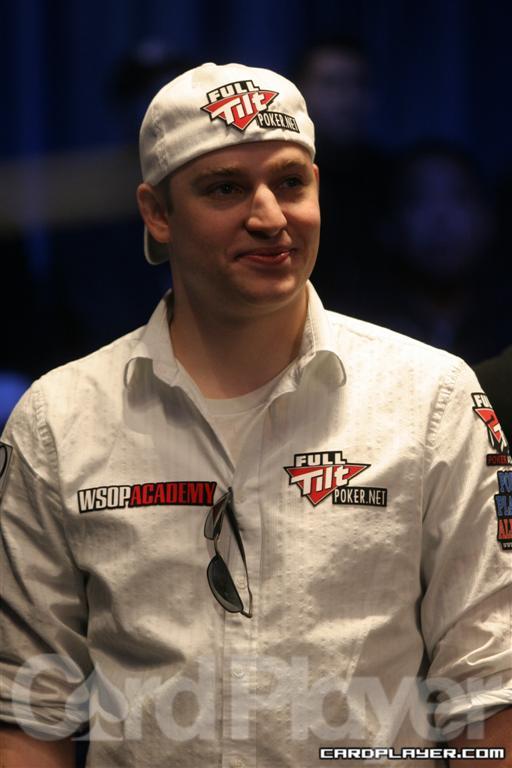
ESPN cameras dart around his head, recording every move from all different angles. Marquis’ family sits just a few feet away, rubbing elbows with the likes of poker legends Doyle Brunson and Phil Hellmuth, who, along with hundreds of others, had shown up to watch history in the making.
A few hours go by without a single elimination. The short-stack, Kelly Kim, has less than two big blinds left in his stack. Despite his desperate situation, Kim decides to fold another hand, just one shuffle shy before his big blind, where he will likely put in the rest of his chips without even looking at his cards. The action continues to fold around to Marquis. He looks down at 7 7
7 .
.
In a matter of a couple seconds, Marquis weighs the options and considers all affecting factors, as well as the gravity of each move. All things considered, with the blinds at 200,000-400,000, he decides to move all in for just under 5 million in chips. The next player to act is Scott Montgomery, who has 11.68 million in chips, and after a mere a sigh of hesitation, he calls and shows A Q
Q .
.
Marquis is now coin-flipping for his tournament life. A coin-flip that would either keep him alive and in great chip position to go after the $9.1 million first-place prize or make him the first player knocked out of the final table, and the only one to make less than $1 million.
With his fate in the hands of the poker gods, Marquis takes off his sunglasses, smiles at Montgomery, and as if without a care in the world, he remains seated to watch the cards fall where they may…
Before Poker
Marquis was born on March 14, 1985. He grew up in Arlington, Texas, with three younger sisters. He had a great childhood that transferred him into a confident, easygoing high schooler. Marquis began balancing work and school at age 16.
After graduation, Marquis spent a year in community college and then attended the University of Texas at Arlington. He continued working 30 hours a week while taking a full load of classes, living the common life of a busy, poor college student. That was until he discovered poker.
Poker Epiphany
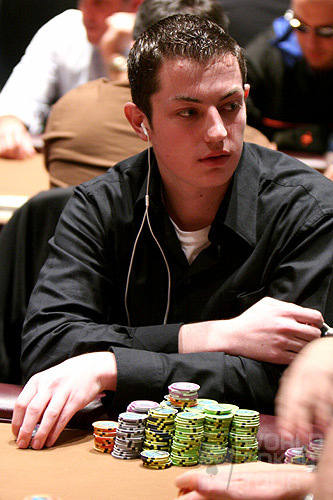 On New Year’s Eve at the turn of 2007, Marquis attended a house party, a decision that would wind up changing his life. Invited by one of his friends, Marquis wasn’t sure who the hosts of the party were, but as he walked through the doors and looked around the place, he couldn’t help but notice that is was a far cry from most humble abodes that guys his age live in. The home belonged to Tom Dwan and David Benefield.
On New Year’s Eve at the turn of 2007, Marquis attended a house party, a decision that would wind up changing his life. Invited by one of his friends, Marquis wasn’t sure who the hosts of the party were, but as he walked through the doors and looked around the place, he couldn’t help but notice that is was a far cry from most humble abodes that guys his age live in. The home belonged to Tom Dwan and David Benefield.
“I saw these guys who were a year younger than me and had all of this nice stuff -- nice cars and a nice house. I’ve always worked my ass off for all of the things I had, so I was pretty jealous of them,” remembers Marquis. “I found out that it 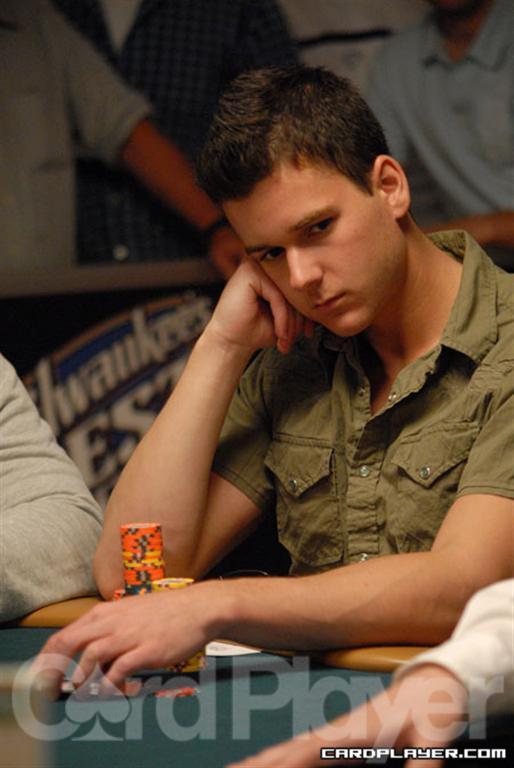 all came from poker. The next day I deposited $100 on Full Tilt.”
all came from poker. The next day I deposited $100 on Full Tilt.”
Marquis began playing poker every day and developed a tight relationship with Benefield and Dwan. He built on his $100 and spent the first month playing $5.50 sit-and-gos. When he reached $1,000, he moved to $50 buy-in cash games. Marquis was still working and attending school, but he played poker online every chance he got. Eight-tabling cash games, Marquis says he saw upwards of 100,000 hands a month, which drastically improved his game. A winning player immediately, Marquis has never had to redeposit money online.
Bankroll Boost
In March 2007, just a couple months after Marquis began playing online, he made a $10,000 score by winning a multi-table tournament on Full Tilt. Just one month later, Marquis realized that his day job selling cell phones was paying less than poker, so he quit.
While he continued to grind out cash games for a living, he couldn’t help but get a tournament fix every now and then. With an added boost to his bankroll and taste of tournament winnings, Marquis decided to make the trip to Las Vegas for the WSOP.
He stayed the summer in a Las Vegas home with 12 other poker players, including Benefield and a not-yet-legal Dwan. Marquis made two small cashes, but he ended up a few thousand dollars down for the Series. He had a hard time making the transition from online to live tournaments.
“When we play online, everything is pretty much handed to us -- our stack sizes, our opponents’ stack sizes,” said Marquis. “You can just glance up, see the action, and know exactly where you stand. Live poker isn’t like that. It’s a lot harder, at least for me, to pay attention to every detail. That was the biggest problem I had.”
Determined and highly competitive, Marquis was disappointed with his results.
“I felt like I wasn’t as good at tournaments as I could be. There were a lot of situations that I was getting into where I didn’t know what to do. That was coming up way too often. I played a lot more over the next year and worked a lot on my heads-up and shorthanded play. Playing a lot of that makes you a better hand reader and increases your understanding of marginal situations.”
Marquis also put school on hold and focused solely on poker.
Try Again
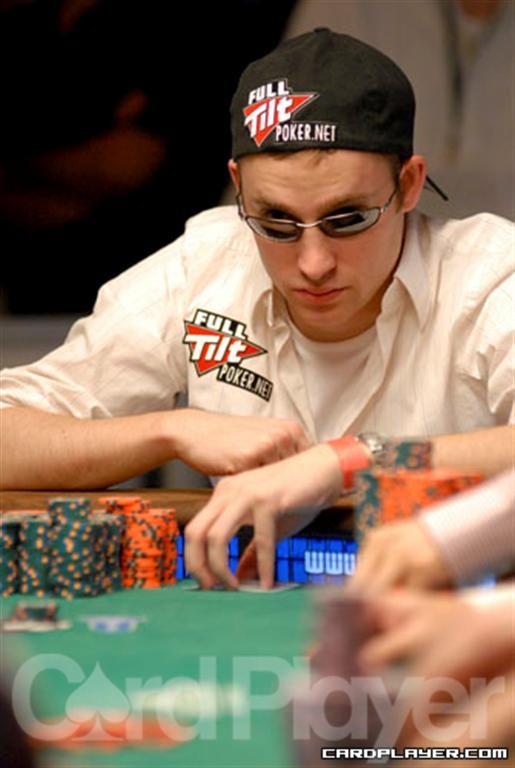
After a year of playing poker professionally, improving his tournament game, and building confidence, Marquis was back at the Rio for another shot at the Series. Unfortunately for him, the preliminary events didn’t go as well as he had hoped.
“I was one for 17 or 18 going into main event,” said Marquis with a laugh. “That being said, I felt like I was playing really well with just a couple of exceptions. I just felt like I was running terrible the entire Series. So, I was telling everyone that I’m going to save all of my luck for the main event, because I wasn’t getting lucky anywhere else. It ended up working out for me.”
It sure did. According to Marquis, the first couple days of play were just a blur. On day three, the money bubble popped, and despite only cashing once during the Series thus far, Marquis wasn’t concerned with merely making the money. All he wanted to do was accumulate chips.
“If I feel like people are going to do something incorrectly, I’ll adjust my style to let them make mistakes. You should always think about adjusting while you’re playing. I think it is absolutely the most important thing you can do when you are sitting at a poker table, especially in tournaments where you are playing with the same people for long periods of time.”
The only problem was that Gus Hansen was two to his left with a big stack. Though Marquis had to fold a few of his raises when Hansen reraised him, the formidable Great Dane was still no intimidating factor to Marquis. Both of them pushed the action, applying pressure to scared money.
“I think one of us won pretty much every single hand on the bubble.”
Once everyone was in the money, it became a matter of just how big the payday would be. Marquis picked up steam at the end of day 4 when he doubled to twice the average stack. Then, on day five, he came across an obstacle.
“I got really si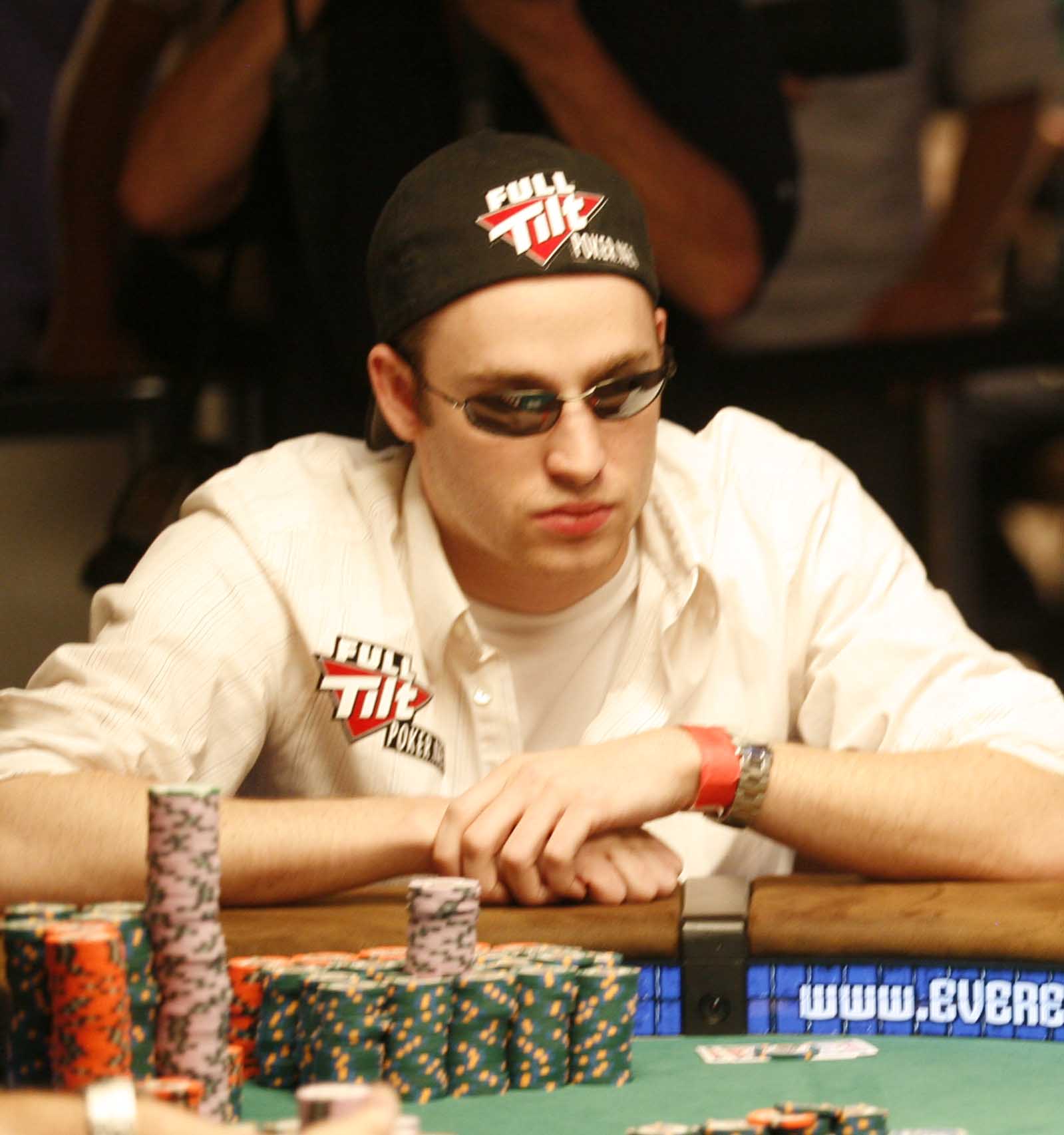 ck. I was sick for day 5, 6, and 7. I just tried to zone out and focus.”
ck. I was sick for day 5, 6, and 7. I just tried to zone out and focus.”
As the field became smaller, the pressure grew to new heights, and on day 7, the tension in the Amazon Room could be cut with a knife as the 27 remaining competitors would play down to the final nine.
With the growing hype caused by the four-month delay for the final table, the players became increasingly aware of the enormity of what was at stake. Already dubbed the November Nine, the players who made the final table were promised fame and riches. Everyone was afraid to bust, but Marquis was one of the players who was not going to let that fear paralyze him.
“There were people playing really tight 27 people down, so I was playing really aggressively.”
His aggression got him to the final 10, which was officially the final-table bubble. Everyone played carefully but aggressively, and Marquis found himself a little short on chips. After a raise and a reraise by Dean Hamrick, Marquis looked down at A Q
Q . He pushed all in, and Hamrick called with Q
. He pushed all in, and Hamrick called with Q Q
Q .
.
The crowd stood up in suspense, staring at the prospect of an elimination that would end play for the next four months. Marquis had fewer chips than Hamrick, and he was behind. The flop came J 7
7 3
3 . Marquis needed an ace or running straight or flush cards to stay alive. The turn was a 4
. Marquis needed an ace or running straight or flush cards to stay alive. The turn was a 4 , giving Marquis a flush draw. It was either a heart or an ace, or it was time to go home.
, giving Marquis a flush draw. It was either a heart or an ace, or it was time to go home.
The river was the 5 .
.
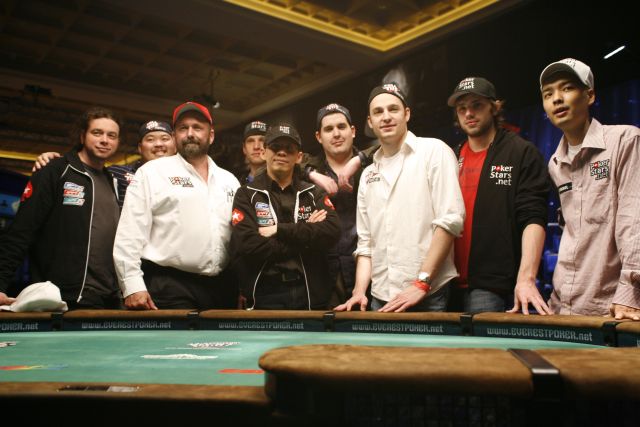
 J
J , and Marquis, ironically, picked up Q
, and Marquis, ironically, picked up Q Q
Q and took him out on what could be considered the biggest bubble in the history of poker.
and took him out on what could be considered the biggest bubble in the history of poker.
The crowd roared and a mixed wave of emotions came over him. He felt excited, relieved, but ultimately, worn out. Pure adrenalin carried him through the media frenzy that followed.
“I did a ton of interviews. I wasn’t really happy with how that worked out. I was so sick and exhausted. We played until like 4 in the morning, and I had to come back at noon to do interviews, so I looked like crap in all of the interviews,” he laughed. “I’m not one to get really nervous in front of cameras. I don’t mind the media stuff, I was just exhausted.”
117 Days of Anticipation
So, what does a young man do with a guaranteed $900,000 in his pocket? Spend a little, that’s what.
The day Marquis returned to Texas, he ordered a brand-new 2009 Audi S5. He’d been eyeing the car for a year but had resigned himself to waiting for a used version. That was before he had almost a million dollars burning a hole in his pocket.
“That was my one big purchase. Come on, I had to splurge on something.”
He also bought his mom a truck, decorated his new place, and topped it off with the installation of a kegerator, a modified refrigerator that dispenses cold beer on tap. For having a $9.1 million and world title weighing on the back of his mind, he admits he was surprisingly laid back.
“I did a lot of relaxing,” he said. “I’m pretty confident with my ability to play. I didn’t think there was any need to get any coaching. Of course, in hindsight, who knows. I’m not a very results-oriented kind of person, though, and I don’t think there was a ton I could have done to improve my game during the break. I also think it’s dangerous to try to learn someone else’s style of play, because you will get into a lot of those situations I was talking about, where you are unsure of what to do.”
Marquis spent the hiatus playing poker, hanging out with friends, and doing a little traveling. He says that he was never nervous, not even the day of the final table.
Flash Forward
Under the bright lights in Rio’s famed Penn & Teller Theatre, 23-year-old Craig Marquis sits at the final table of the 2008 World Series of Poker main event.
After hours of play, no one has been eliminated, and Kelly Kim remains the severe short-stack.
“He was really affecting the dynamic of the table and made it a lot less profitable to three-bet shove on anyone because everyone was just playing so tightly, except for the ones with a ton of chips.”
Needing to pick up a hand himself to aid his dwindling stack, Marquis looks at 7 7
7 . In a matter of a couple seconds, Marquis weighs all options and considers all affecting factors as well as the gravity of each move.
. In a matter of a couple seconds, Marquis weighs all options and considers all affecting factors as well as the gravity of each move.
“Before the final hand, I’d only played four of five pots. I’d been pretty card-dead. I played A-J, A-Q, A-K, and sixes. With Kelly Kim having 1.5 big blinds, I look down at sevens in mid position, and what it comes down to is that I can either shove and realize that there is a chance I could get knocked out this hand, but they’re is also a pretty good chance I can steal the blinds or that I’m flipping for third place in chips. So, with the stack sizes and the fact that Kelly Kim is not 100 percent going to be knocked out the next hand, I felt like it was a shove. I didn’t go there to try to make eighth-place money. I went out there to win. There was really no point, in my opinion, to try to squeeze my way up the money ladder, at the cost of a chance to win, because if I didn’t see a better hand than sevens in the next two orbits, I was pretty much hosed, even if I doubled up, I still had no chips. So, I went with it.”
Marquis shoves his chips into the pot with one motion and says, “I’m all in.”
Montgomery looks at his cards, thinks, checks them again, and calls with A Q
Q .
.
With his fate in the hands of the poker gods, Marquis takes off his sunglasses, smiles at Montgomery, and, as if without a care in the world, he remains seated to watch the cards to fall where they may …
The two good-sported competitors engage in some friendly banter.
“Oh I’ve even got you double-suited. You are totally crushed. No flush for you,” jokes Montgomery.
“Oh yeah, I can’t hit my four-flush again,” Marquis says, referring to the hand he doubled up on against Hamrick to avoid the final-table bubble. “It would only be appropriate, though. A-Q gave me the tournament; for it to take it away would be… ironic.”
The flop comes A 10
10 7
7 . Marquis now has the hand dominated and would only lose to a runner-runner straight or full house.
. Marquis now has the hand dominated and would only lose to a runner-runner straight or full house.
“Any kind of 10 or above,” Montgomery says, desperately calling for any turn card that would keep his hand alive.
“That’s not a lot of outs,” says Marquis with a smile.
The turn is the J . Now Montgomery has four outs to make a straight. He needs a king.
. Now Montgomery has four outs to make a straight. He needs a king.
“At least I get a sick sweat, right?” says Marquis.
“With four outs, how could I possibly miss?” Montgomery jokes back.
A sarcastic question turns quickly into a grim reality for Marquis. The river is the K . The crowd erupts, and Marquis is the first player eliminated from the main event final table.
. The crowd erupts, and Marquis is the first player eliminated from the main event final table.
Marquis shrugs his shoulders, smiles, and gets up from the table. After shaking the other finalists’ hands, he joins his family.
When asked about how well he handled his brutal elimination, he non-chalantly says, “That’s just my attitude about poker. My wellbeing doesn’t hinge on a single poker hand, even if that is the highest stakes I’ll ever play for. Whether I win $900,000 or $9.1 million, it doesn’t make a huge difference. I still won a ton of money playing poker. The biggest thing is that I’m not going to be a sore loser. In my opinion, there’s just no other way to handle things. It’s just one of those things that happens when you play poker. You win some and you lose some.”
Life After the November Nine
After the whirlwind surrounding this year’s main event, life for Marquis is, well, pretty much the same as it was before. He continues grinding a living at the same cash game stakes he played prior to his big cash, and he humbly says that he doesn’t feel the need to play with others that are better than him.
“Life is not that different. I just have a little more financial flexibility,” he said. “I can help my family out more than I used to be able to. All the things I ever wanted to do or had a small interest in learning, I’m going to try those things out. It should be a fun year.”
As far as this being the start to an exceedingly long career in poker, he’s not so sure.
“I can’t see myself being a Doyle Brunson or Phil Ivey, spending my life playing poker. I’d rather do something else … well, I’d rather do nothing else,” joked Marquis. “Maybe I’ll go back to school or travel some more. I don’t know, we’ll see.”
Marquis’ combination of competitive attitude and positive outlook on life  is one that has gotten him where he is today. Should he choose another path away from poker, it’s a safe bet that he’ll be successful. While fame and fortune hasn’t changed his life much, there is one significant difference. Marquis has a new car.
is one that has gotten him where he is today. Should he choose another path away from poker, it’s a safe bet that he’ll be successful. While fame and fortune hasn’t changed his life much, there is one significant difference. Marquis has a new car.
His 2009 Audi S5 with Phantom Black Pearl Effect exterior and magma red leather interior was delivered yesterday.
